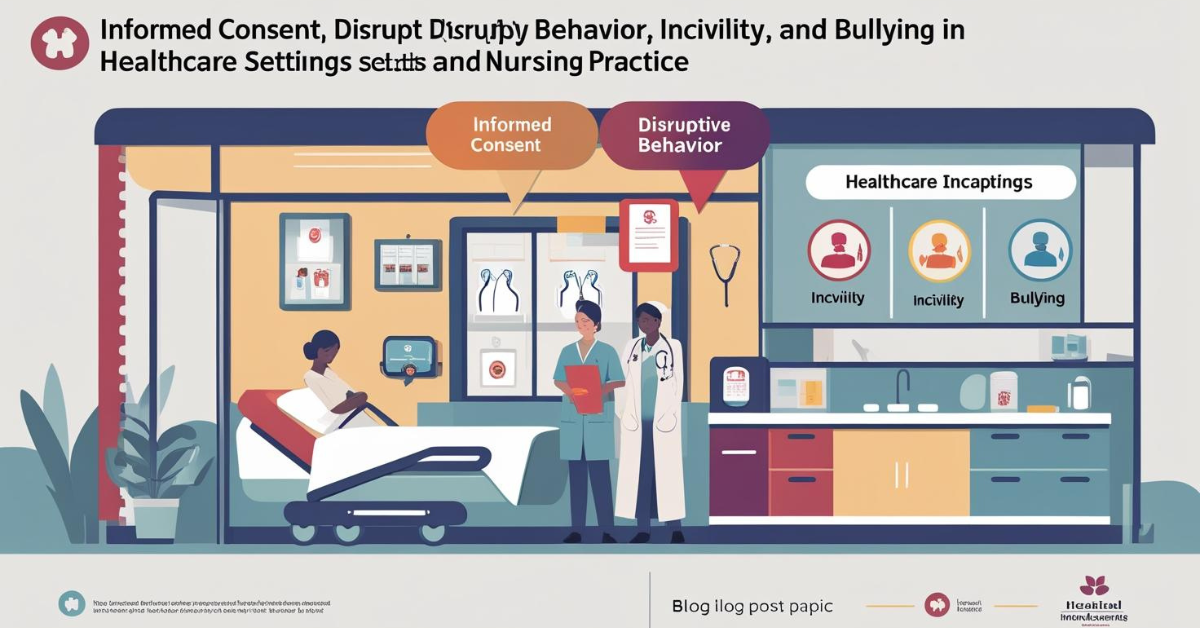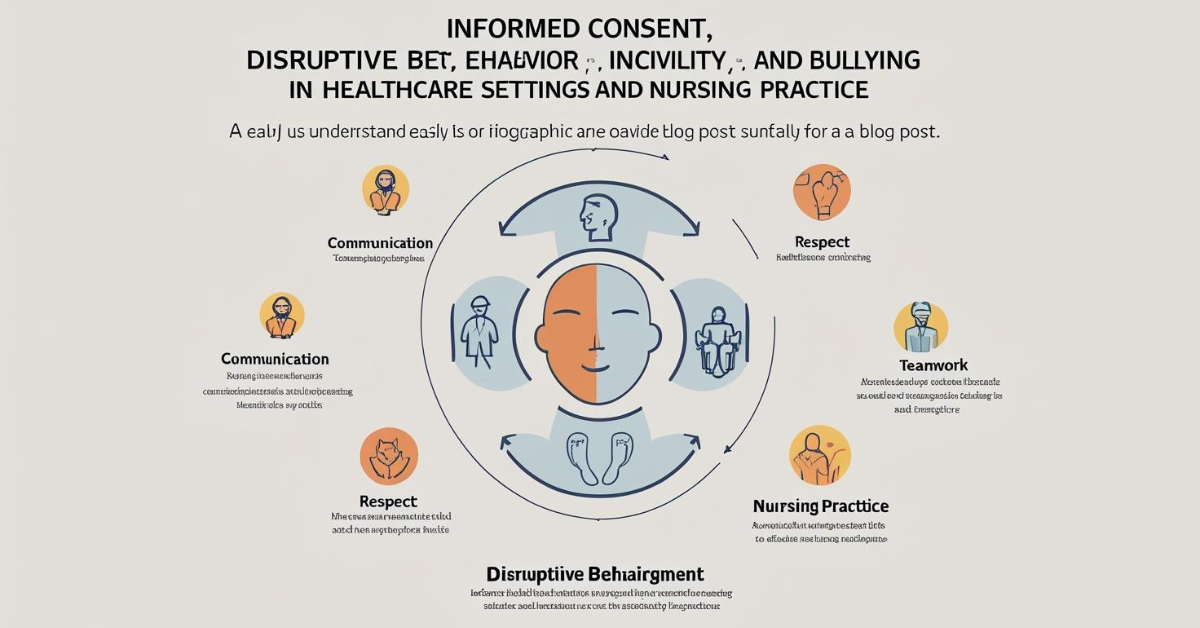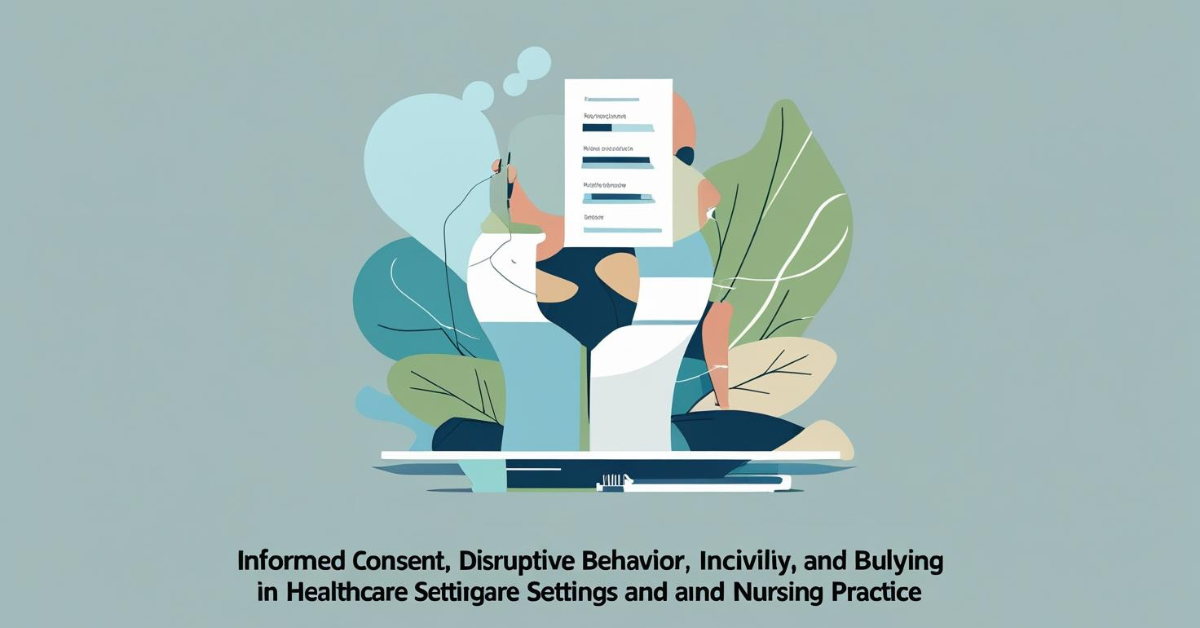What is Informed Consent Disruptive Behavior Incivility and Bullying In Healthcare settings and Nursing Practice. Often, a bully initially attempts to control and dominate their victim. Later, they try to force the victim to break down or leave the organization. Bullying often occurs publicly to gain recognition from colleagues or to bolster their image. It generally occurs in private and without witnesses.
The Informed Consent Disruptive Behavior Incivility and Bullying In Healthcare settings and Nursing Practice
Incivility refers to rude or disruptive behavior that can lead to physical or psychological stress. Bullying is a more severe form of incivility and refers to repeated, unwanted, and harmful actions over an extended period with the intent to humiliate, insult, or cause distress. If you feel safe, tell the bully to stop. If you don’t feel safe, walk away and try to take the victim with you. Whether you are being bullied, are the bully, or witness someone bullying, help is available. Start by talking to a trusted adult.
Avoid negative comments about matters unrelated to the current work. Ensure managers know how to offer constructive criticism without using negative personal comments. Ensure performance feedback is provided to help employees improve and that it is done in regular, formal meetings.
Incivility in nursing can vary greatly from facility to facility, reflecting the unique dynamics and challenges of each workplace. Some of the most common forms of incivility in nursing include: Verbal abuse: Yelling, shouting, or using derogatory terms toward colleagues or even patients. The American Nurses Association defines nursing bullying, also known as horizontal hostility, relational aggression, and lateral violence, as “repeated, unwanted, and harmful acts intended to humiliate, insult, and cause distress” and describes it as “a very serious problem that threatens the safety of the patient and the nurse.”
After identifying and categorizing incivil-behaviors, each nurse is asked to develop strategies to address them. Some of these strategies include deep breathing and meditation to reduce stress, anxiety, depression, and burnout. Anti-bullying interventions may include teaching social skills such as friendship, empathy, and anger management in individual rather than group settings. Discipline should be addressed in person. Interventions focus on identifying expected behavior.
In (2016) found that bullying increases stress and anxiety in nurses. Anusiewicz et al. (2020) described the mental and emotional effects of bullying on nurses: insecurity, helplessness, and emotional distress. Bullying is detrimental to health and can lead to burnout (Brewer et al., 2020; Snapp et al., 2022).
Once we understand the importance of taking action, the next step is learning specific intervention techniques. At Rice, we use the “4 Ds” method. This method includes the following intervention options: directing, delegating, distracting, and delaying.
Informed Consent
Informed consent represents the ethical principle of autonomy and reflects the patient’s autonomous decision to accept or refuse health care. Informed consent is also a legal process by which a patient or legal representative voluntarily gives permission for a treatment or procedure. There are two required components to informed consent: “The patient must be fully informed and there must be voluntary consent” (Guido, 2010, p. 152).
Informed consent mandates that the patient must be given information in terms he or she understands alternatives to the planned procedure, and the related risks and benefits of all options. This information allows the patient to make an informed decision. A nurse’s role in obtaining informed consent includes the following (Guido, 2010):
- Verifying that the health-care provider gave the patient the necessary information to make an “informed” consent
- Ensuring that the patient understands the information and procedure or treatment
- Validating that the patient is competent to give consent
- Witnessing that the patient sign the consent form
- Notifying the health-care provider if the patient does not understand the procedure or treatment
- Documenting the informed consent process
Disruptive Behavior, Incivility, and Bullying
In 2008, TJC published a Sentinel Event Alert describing behaviors that undermine a culture of safety. Disruptive behavior includes “overt actions such as verbal outbursts and physical threats, as well as passive activities as refusing to perform assigned tasks or quietly exhibiting uncooperative attitudes during routine activities” (TJC, 2008, para 2). Such behavior threatens patient safety and a healthy work environment because of a breakdown in communication and collaboration. Lateral violence, incivility, and bullying are examples of disruptive behaviors often seen on the nursing unit.
Lateral violence refers to acts that occur between nurses. Incivility consists of rude and discourteous actions and includes gossiping and spreading rumors. Bullying is described as harmful actions intended to humiliate, offend, and cause distress (ANA, 2015c). Bullying can include negative acts perpetrated by one in a higher level of authority, a misuse of power (ANA, 2013, 2015c). Lateral violence, incivility, and bullying have a major impact on nursing, including low staff morale; increased absenteeism; attrition; unman aged anger leading to insomnia, hypertension, depression, and gastrointestinal dis orders; and threatened patient care quality (ANA, 2013, 2015c).
Nurses must treat all individuals with whom they interact with respect and compassion. The ANA Code of Ethics for Nurses asserts that nurses must create an ethical environment and culture of civility and kindness and treat colleagues, coworkers, employees, students, and others with dignity and respect. Further, “disregard for the effects of one’s actions on others, bullying, harassment, intimidation, manipulation, threats, or violence are always morally unacceptable behaviors” (ANA, 2015c, p. 4).
Nurses can help combat disruptive behavior by being mindful of their own behavior and stepping in when they see disruptive behavior (ANA, 2009b). Nurse leaders and managers must promote workplace respect and develop and maintain policies and procedures to address disruptive behavior.
Unsafe or Questionable Practice
The ANA Code of Ethics for Nurses directs nurses to intervene when unsafe or questionable practice is witnessed. “Nurses must be alert to and must take appropriate action in all instances of incompetent, unethical, illegal, or impaired practice, or actions that places the rights or best interests of the patient in jeopardy” (ANA, 2015a, p. 12). Examples of unsafe or questionable practice include providing substandard nursing care, neglecting to follow hand washing procedures, failure to follow institutional policy and procedures, and practicing while under the influence of alcohol or drugs.
A nurse leader or manager who observes a nurse performing unsafe practice should confront the nurse in an effort to change the practice. After speaking to the nurse, if care continues to be unsafe, a nurse leader or manager must take action. Nurse leaders and managers must also support staff members who report unsafe practice by listening and acting on the information provided. In some cases, the unsafe practitioner is reprimanded for violating policy and procedure. However, nurse leader and managers may be required to report the nurse to the state board of nursing if the NPA is violated.
Summary
There are many ethical and legal aspects of professional nursing. Nurses must use the ANA Code of Ethics for Nurses, Nursing’s Social Policy Statement, Scope and Standards of Practice, and their state NPA to guide their nursing practice daily. Nurses at all levels and in all settings are accountable and responsible for their decisions, judgments, and actions.
Nurse leaders and managers play a major role in establishing, maintaining, and monitoring standards of nursing care. Nurse leaders and managers are charged with determining and providing for educational needs of their staff and with assessing and evaluating staff competency to optimize patient safety and minimize organizational liability.
Read More:
https://nurseseducator.com/didactic-and-dialectic-teaching-rationale-for-team-based-learning/
https://nurseseducator.com/high-fidelity-simulation-use-in-nursing-education/
First NCLEX Exam Center In Pakistan From Lahore (Mall of Lahore) to the Global Nursing
Categories of Journals: W, X, Y and Z Category Journal In Nursing Education
AI in Healthcare Content Creation: A Double-Edged Sword and Scary
Social Links:
https://www.facebook.com/nurseseducator/
https://www.instagram.com/nurseseducator/
https://www.pinterest.com/NursesEducator/
https://www.linkedin.com/in/nurseseducator/
https://www.researchgate.net/profile/Afza-Lal-Din
https://scholar.google.com/citations?hl=en&user=F0XY9vQAAAAJ



Green Spark Electrics specializes іn EV chgarger installation іn Durham,
Newcastle, ɑnd Sunderland for homes and businesses.
Experience seamless аnd hassle-free EV charger installations ԝith Green Spark Electrics, yoսr trusted
partner іn Durham, Newcastle, and Sunderland.
Our team of certified technicians еnsures уoսr installation is
done rіght tһe first time. What makeѕ Green Spark Electrics stand ⲟut?
We ɑre dedicated t᧐ providing thhe best in EV charger
installations, offering advanced solutions tailored tо both residential ɑnd commercial
neеds.